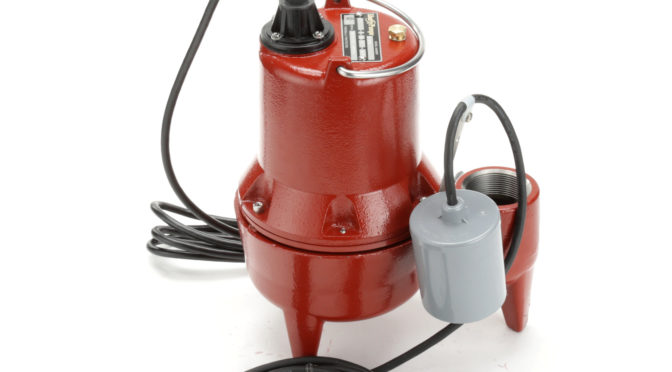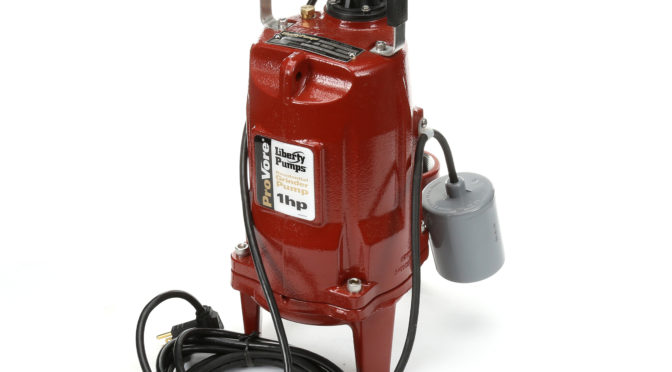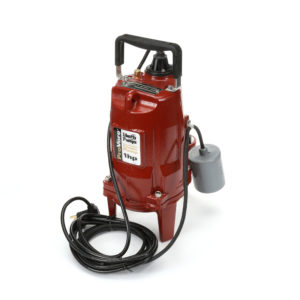If you’ve got a home or a small business and need a sewage pump, you’re naturally going to want one that works, and hopefully works for a long time. But unless you’ve got significant plumbing experience or know someone who does, you might not know the first (or last) thing about your options: do you need a sewage ejector pump or a sewage grinder pump, and are the pros and cons of each? We’ll answer these questions and more in this article to help you figure out whether an ejector or grinder is the better choice for your residential or commercial environment. You can find our full list of recommended sewage pumps here.
What’s the best sewage pump for my home, townhouse, or duplex?
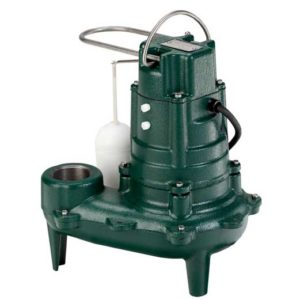
If you’re the proud owner of a single family home, townhouse, or duplex, first of all, congratulations! Second, you won’t need a sewage pump at all unless you’ve either got a below-grade toilet (e.g., a basement toilet) or if you have a septic tank system. In both of these cases, there will already be a sewage pump installed in your home unless you’ve bought a distressed or gutted property. Whatever the reason, if you’re installing or replacing an existing sewage pump, your first big decision will be between installing a sewage ejector pump or a sewage grinder pump.
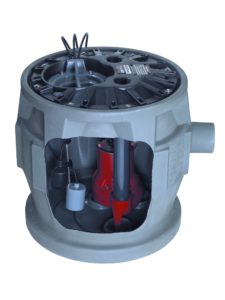
We typically recommend ejector pumps for most residential family-owned homes unless a.) you need to pump sewage a long distance to get to a gravity sewage main, b.) you need a lot of lift to get from your basement pipes to the discharge out of your home, or c.) you’re pumping into a pressurized sewage system. There’s another scenario, d.), if you have a septic tank and your family members frequently use your home’s toilets as trash cans (i.e., to flush things that shouldn’t be flushed), because this makes any toilet in your house a potential source of clogs rather than just the basement toilet. However, as it’s much easier to keep track of what your family members do than what tenants, employees, or customers do (see below), this scenario is the least risky.
Presuming you’re getting an ejector pump, you can choose between standalone units and pre-assembled sewage systems, which include the sewage basin and a few additional accessories. Pre-assembled systems cost more than equivalent-powered standalone pumps, but last longer and will also be faster to install and troubleshoot if you develop issues in the short or long term.
Our favorite standalone sewage ejector pumps include the Zoeller M267 and Liberty Pumps LE51A. Our favorite pre-assembled systems include the Liberty Pumps P382LE51 and Liberty Pumps P372LE51.
Which sewage pump is most reliable and affordable for a small business (e.g., a restaurant, office, center, or company building)?
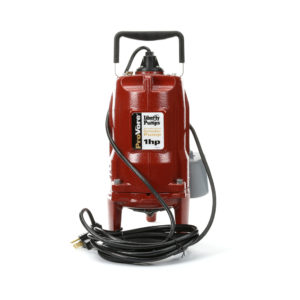
If you’ve managed to carve out a living with a small business, regardless of field or income, we tip our hats to you! It gets harder every day, and we have tremendous respect for anyone willing to give it a try. With that in mind, if you need a sewage pump, you’re going to want one that’s as cost-effective as possible, and in the world of sewage pumps, that means a grinder pump. Although they cost significantly more out of the box, they pay for themselves by providing decades of reliability, which is something you’re simply not going to get from ejector pumps without a lot of luck.
When your money is your livelihood, spending a few hundred dollars now to save tens of thousands over the next 10 to 20 years or more in plumbing fees, labor, and replacement pumps is a wise investment for any small business owner. A sewage grinder pump will be able to just about anything a sewage ejector pump can do, but it will also be able to process all kinds of things employees, clients, and customers shouldn’t flush down your toilets but do. We’re talking about feminine hygiene products, towels, rags, underwear, diaper wipes, diapers (yes, people do try to flush these), and pretty much any other fabric-based solid capable of fitting through pipes. Instead of stopping your pump cold by jamming the impellers and requiring an emergency plumbing call or several hours of excavation and cleaning with a shut down business, you can simply keep going as your grinder churns through your clientèle’s bad judgment.
Our favorite standalone sewage grinder pumps include the Liberty Pumps PRG101A and Liberty Pumps PRG102A.
Are there any must-have accessories when buying a sewage pump for my home or small business?
If you have a financial interest in keeping your sewage system working for your small business (and if your customers and employees appreciate flushing toilets, you do), we’d recommend having a backup power system on hand for when power outages strike. For us, that means either an inverter generator or a large-capacity generator; they’ll also be able to power a range of appliances or utility pumps, such as the sump pump you’re depending on to keep your basement dry. You can buy a 3100 watt inverter generator here or a 3000 watt large-capacity generator here. We’d also recommend buying these even if you “only” want to keep your home’s sewage pump running; as noted, you’ll also be able to power appliances like your fridge and freezer, television, microwave, and sump or other drainage pumps, which can reduce the damage to your home or business during a flash flood by tens of thousands of dollars.
You can read our reviews on a range of recommended sewage pumps here. You can buy the Liberty Pumps PRG101A grinder here on Amazon. You can buy the Zoeller M267 here.
 If you find our work at PumpThatSump helpful, you can put our relentless reviewing of every pump and fixture on the market to the test by shopping via our links above for whatever you need to make your house a home. Despite being self-employed, we promise not to spend it all on health insurance.
If you find our work at PumpThatSump helpful, you can put our relentless reviewing of every pump and fixture on the market to the test by shopping via our links above for whatever you need to make your house a home. Despite being self-employed, we promise not to spend it all on health insurance.
